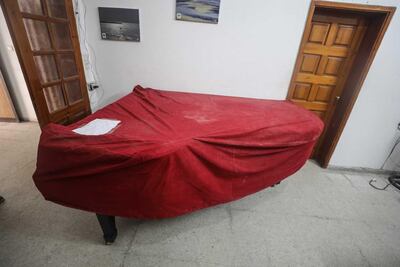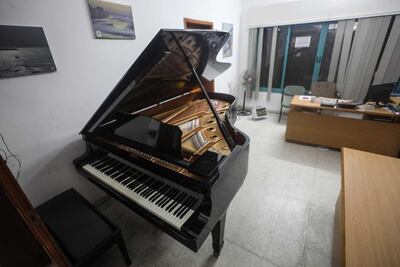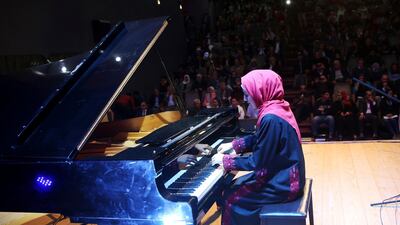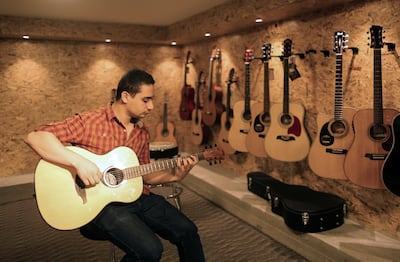Right now, the Gaza Strip's only grand piano is covered by a big bit of bright red fabric. A piece of paper has been stuck on top haphazardly, a scrawled note that reads simply: "no touch".
The sleek, black Yamaha has been through a lot already, but after being used in a rare public concert last year, in which a group of Japanese and Palestinian pianists performed to a crowd of 300 people at the home of the Red Crescent Society, the piano was seized by the Ministry of Culture and locked away in an office.
Japanese pianist Kaoru Imahigashi played the instrument expertly and opera singer Fujiko Hirai performed Fantasy on Sakura Sakura, one of Japan's most famous folksongs, before the piano was placed front and centre in a strange property dispute.

An early history
The instrument first arrived in Palestine in 1998. It was donated by the Japanese government and left in one of Gaza's theatres, where large concerts were held regularly, before the Second Intifada, or Palestinian uprising against Israeli occupation, in 2000. The venue was in the now-abandoned al-Nawras resort, north of the Strip.
After the theatre was closed in 2007, the piano sat unused, decaying, until a missile attack during the conflict in 2014 left it completely unplayable. The instrument survived, however, and Brussels charity, Music Fund, painstakingly restored it over the next three years. The performance in 2018 was the instrument's first public appearance in a very long time.
Saed Herzallah is the businessman who bought the resort and all its contents in 2011. "The piano was in the building," he tells The National. "We took it out from the rubble and it was in bad condition. I contacted one of the Belgian relief associations that visited Gaza after the war and told them about the piano and they sent an expert, who fixed it."
Here's where it gets complicated
Herzallah then lent the instrument to the Gaza branch of the Edward Said National Conservatory of Music for the concert. And that is when it all got a bit complicated. Herzallah claimed the piano was his, alongside the rest of the contents of al-Nawras, but the Ministry of Culture said it belonged to Palestine, as it was originally a gift from Japan.
After lengthy negotiations, that even involved the Ministry of Interior, they reached an agreement. Herzallah would give the ministry the piano, if they signed a document saying they took it. That is just so he has proof that they seized the instrument from him, Herzallah explains, in case anyone eventually came looking for it.

Saher Younis, a representative of the Japan International Co-operation Agency in Gaza, told The National that the Japanese government was also involved in these discussions. Japan is known to support a two-state solution in the region that they say would allow Palestine and Israel to live "side by side in peace and security", and has given $1.8 billion (Dh6.6bn) in aid to Palestine since 1993, its Ministry of Foreign Affairs says. This aid historically extends to the music scene, too. "We asked them to take the piano back and put it in one of Gaza's musical institutions, so people can use it," Younis says.
What the instruments mean to Gaza
In Gaza, pianos are almost like gold dust; they are extremely expensive and difficult to import, with a 12-year blockade making it tough to get instruments into the Palestinian enclave. Meanwhile, the number of music teachers in Gaza who are able to teach the instrument is also dwindling. Herzallah's plan was to return the Yamaha to the abandoned resort, which he aims to renovate. However, as it is not in a particularly convenient location, that meant the budding musicians of Gaza would miss out on learning how to play a real grand piano.
Ismail Dawood, manager of the Edward Said National Conservatory of Music in Gaza, which has just one instructor on its roster who can teach piano, says that is not good enough. "It is a unique piano and the only one in Gaza, and to leave it not working is a big loss," he says.
He is just one of many people who want the instrument to be played again soon, as music is one thing that provides some relief to those who live in a territory that for years has been caught in an endless cycle of conflict. Fortunately, it seems that it will not be long before Dawood gets his wish. Areef Baker, the Ministry of Culture's chief of public relations, has confirmed to The National that, after months of discussions, the piano will be returned to the Palestinian people very soon. "We formed a committee to take care of the piano and to locate it in one of the artistic institutions to serve the Palestinian cultural scene," he says.
This committee, he explains, visited about 20 cultural associations around the Gaza Strip to help them to decide where the piano's new home should be, according to a set of strict criteria. While they haven't yet settled on a place, Baker says it is just a matter of weeks until they do.
The ministry is currently conducting training courses for music students, who are learning to play using instruments that have often been donated by relief associations, and it is hoped that the beloved piano will make a reappearance at their graduation ceremony, which the Japanese ambassador is supposed to attend.
"Music is very important [here]," Dawood says. "If we can play music, we can change the cliche of Gaza."
Why is a grand piano so important to Gaza?
A 12-year-long blockade means getting access to new musical instruments in Gaza can be difficult. Everything has to come in via the border crossing with Israel and needs approval from the authorities. This green stamp, unsurprisingly, can take a long time to secure.
It's particularly difficult to bring in a piano, music shop owner Raji Al Jaru, 27, explains. "We can bring in any instrument except the piano, because of its huge size," he tells The National. "These instruments can be damaged if they're left for a long time under the sun. And that's happened, because it was seized at the border until the Israeli authorities gave approval for it to enter Gaza."
Al Jaru, who opened the first music shop in the self-governing Palestinian territory with his father in 2017, imports a wide range of instruments via the Rafah Border Crossing, which is under Egyptian control, or through the Kerem Shalom border, which is managed by the Israel Airports Authority. While the approvals to bring things across the border can be tough and tiresome to get, this isn’t the biggest obstacle in the way of the people of Gaza getting access to pianos, Al Jaru explains.
The hardest thing is actually raising the funds to pay for such an instrument, and that’s why he doesn’t have a single one in the shop – because they’re just so expensive. Keyboards, which he does have, cost between $80 to $270 (Dh295 to Dh990), he explains. The cost of pianos he couldn’t even begin to fathom.
The border blockade also means it’s difficult for the shopownerAl Jaru to travel abroad and fix the instruments he buys. “I feel that I am paralysed because I can’t go to buy the instruments bymyself, and at the same time I will risk my money, because I must buy the instrument without fixing them.”
It may be a vicious cycle and running a music shop is a tough gig in Gaza, but at least it’s better than what he was doing before that, he says. “I graduated from commerce college as an accountant, but I didn’t find any work opportunities, so I thought it would be best for me to start my own business. And because I love music, I chose to open a store to sell musical instruments.”
Al Jaru is also a self-taught musician – “I learnted how to play music from YouTube” – and his instrument of choice is the traditional oud. Luckily, this and the guitar are easy to import, he says, because they’re affordable (about $100 to $250).
He tells us that “interest in music is increasing with time” in the Palestinian cityGaza, but that instruments still need to be made more accessible and affordable.
“People want to learn,” he explains, “but unfortunately the number of people who can actually afford to buy instruments is limited because of the bad economic situation.”


